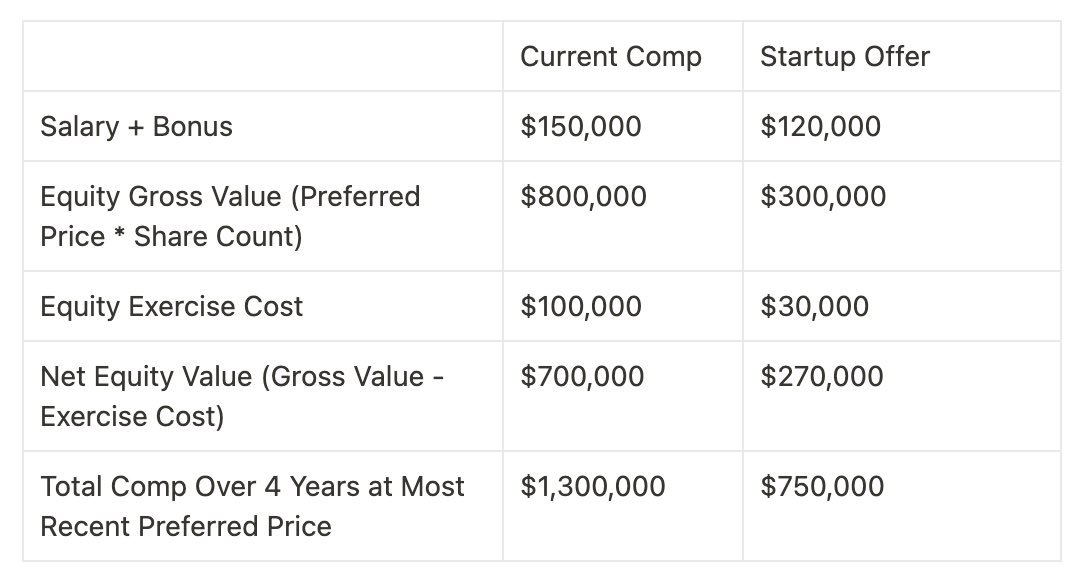Joining a startup: How to think about equity compensation
I’ve joined four early-stage startups anywhere from first employee to 40th employee. Each time, I’ve learned more about equity compensation as my own personal goals, financial situation and expectations have changed. In having conversations with people looking to join an early-stage startup (Seed to Series B) and making decisions about their offers, I figured I’d share my thoughts on compensation and how you might think about it.
First, it’s worth noting that you should spend far more time deciding whether you think the startup you’re joining will eventually grow to be 10X/20X/100X in revenue or valuation than it is today, rather than optimizing for compensation. When I joined Stripe at 28 employees, I was told there was no negotiation of my offer, but I felt the offer was fair and joined to see the company go from a $500M valuation to a current-day $50B valuation. Picking correctly is more important than optimizing for compensation, but you should understand what trade-offs you’re making, and when you can optimize a compensation offer, you should.
Calculate current comp & startup offer comp
First, make a spreadsheet and calculate your current comp compared to your startup offer. Here’s an example:
Expectation-setting
If you're coming from a larger company (by employee size, funding round, etc.), you shouldn't expect the smaller startup to beat your cash comp or your overall comp (cash + equity) based on the value of the equity today. For example, I’ve made less in cash + equity comp (at the time it was granted) in every move I’ve made to join a startup. But it was worth it, because the equity value grew far beyond the value from when it was granted. You're betting on the startup being more valuable in four years to make up for that gap.
In the example below, you have to believe the company you’re joining will be able to 3X in value in order for you to beat your previous comp. If you don’t believe that’s possible, and you’re optimizing for overall financial outcome (note: not everyone is), you shouldn’t join the startup.
Optimize for equity
I firmly believe that you should optimize for equity, after you feel your cash comp is comfortably covering your living expenses and other needs. Why? If you choose to take less cash in exchange for more equity as part of your offer, in a high-growth startup, your cash comp will often be corrected over time by an in-house people ops/compensation team that will bring your cash up as the company grows. Of course, if you choose to optimize for cash, you might get a generous equity refresher if you're performing well over time, but that’s more rare and it may not be at the option price it was granted at when you joined (and as a result, you'll be paying a lot more to exercise those options).
Determine your market value
I recommend spending some time figuring out what your market value is. Ask your friends in the same role/level in a similar size/stage company for their compensation info. If you don’t have friends at a similar size/stage company now, but you have friends who joined a company at the same stage/size, compare their equity value (at the time it was granted — not at what it’s valued at today) to the equity value of your offer. If you have friends who work in VC or at companies where they have access to data from Pave/Option Impact, ask them for comp data for your role at companies at a similar stage/size. Make sure you’re comparing apples to apples. A pre-IPO Stripe is not a “startup” that is similar to a 30 person Series A company with $3M in revenue. There are significant differences in comp even from a Series A to C stage startup, so make sure your market data is a good comparison point.
Prepare for a conversation
Now, you’ll have a full picture of your current comp, your offer and some market data. This will arm you with enough to have a transparent conversation about what you feel is fair and reasonable given certain startup outcomes (a 3X, 10X, etc.). If you believe your offer doesn’t match what other similar companies are paying for a given role, then I would bring your data points up in discussion with your recruiter and hiring manager. I recommend coming from a place where you want to understand how they got to their number—compensation isn’t always easy for startups to handle either and for certain roles, there are relatively few accessible data points.
I hope this helps those of you looking for your next startup role.


